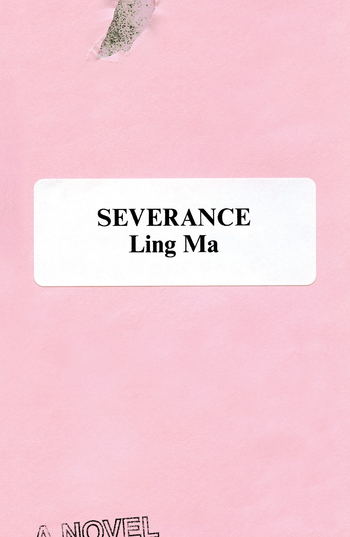
Severance
Ling Ma
Farrar, Straus and Giroux
Review by Émilie Kneifel
Brand names, and so many other unchosen memories, litter Ling Ma’s apocalypse in her debut novel, Severance. Their fluorescent logos—the seven, the eleven, that NY-loving heart—the epitome of over-promise, blink in protagonist Candace Chen’s mind, blink-blink and shudder like half-dead signs on a highway. Society has devoured itself—a pandemic with spooky-familiar symptoms has scorched most minds—and yet its jingles, now gaunt, still linger. She hums along.
She hums because these catchy specificities do more than just blare—they can hold. When she clutches Pepsi, it isn’t just dark, sweaty cola; it’s the effervescent burning of her childhood nights in Fuzhou. Nor is Clinique a mere daily moisturizer. It will always be the tight kneading of her mother’s devotion.
As for me, Ling Ma’s lyrics are still stuck in my head. A fire escape “winces” with new lovers’ feet, clusters of shadows “tumble ahead of us”, a “smaller part of [Candace]” latches onto an older man’s Mandarin. Reverent to sentences’ instantaneous chemistry, how they flare red to dissipate, Ma’s every syllable is painstaking. She knows the stakes: so many finite blinks and breaths.
As for Candace, former Senior Product Coordinator in the Bible Division at a book production company, she can look at a product and see all the fingerprints. Somebody made this—and it, everything, is something else, bottled.
These curling, sulphurous perfumes of another era engulf her, quake her just beyond her own body. She’s a little translucent; stories stride through her. Some endings distort as she offhandedly adds that she was just watching the “we” smoking weed, or that she wasn’t actually there. “New York has a way of forgetting you,” she says. Candace has a way of forgetting herself.
As Candace wanders, alone-but-not, after the ghosts of her immigrant parents, toward some speculative future, her stories migrate in their own forceful direction. But they also stumble—they warp and split open only to shriek awake, never really having left. As much as Severance honours the human tradition of trudging across unfathomable distances, it’s a story too about cycling back. How routine can sustain you, as you grief-wander a city every day for a summer; how airily it can become you, like the first love that sinks, a retainer soaking in the same mug on the same shelf, forever. And it’s about how habit can kill you, in more ways than one. How even self-destruction can soothe in a cycle.
What Ling Ma so deftly cracks about the end of the world, any world, is the subsequent grieving process—and grief’s own stubborn recurrence. As in any dystopia, Candace has new days to endure in an emptier world, but Ma lets Candace feel the past’s death. Lets its stories return, full force, unannounced. To let us know that Candace will always be able to spot the everest of sweaters piled onto the bed—no matter how distant the peak, no matter how many black bags she could fill and try to truck elsewhere. And what Ma understands is that it isn’t really the mountain. It’s the scratch-n-sniff sticker cemented onto the wall. It’s the goopy details that slice clean the heart.
Severance’s what-now isn’t gutted; it’s well cluttered with spirits and their proper noun bags. (As for human religion, its artifacts crumble like anything else. Candace dreams of torn Bible pages.) Maybe Candace was left behind because she herself was always kind of ghostly: both yanked across so many chasms and still so undisturbed by gravity. Or maybe, like a well-timed advertisement, this is all just a coincidence designed to be taken personally. A peeling insurance billboard giggles near the book’s end, “Life is knowing what you live for!” In her new, dead world, Candace does have something to give her feet traction. Which isn’t a god or a sign, but just that. Finally that. Her own knowing.
Émilie Kneifel haunts Montreal and moonlights as everyone (a critic) at Adroit, PRISM, The Puritan, Exclaim!, and Bearded Magazine. Émilie‘s first-born poems are forthcoming in Bad Nudes.